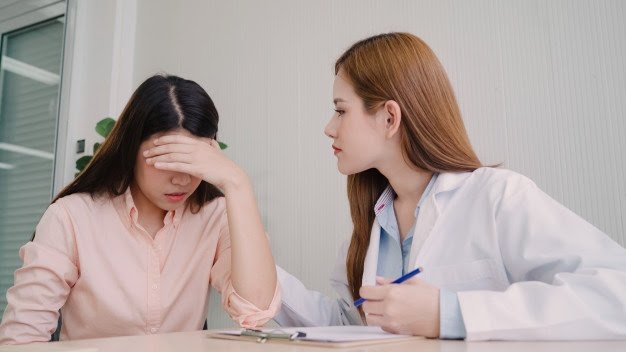
Menopause and mental health
Posted By Dr. Deepti Asthana on 15-09-2021
Menopause is when your period stops permanently. Menopause is a natural stage in a woman's life. You may have menopause symptoms and irregular periods as your body changes to menopause over time. In, the average age for menopause is 52. As a result of the hormonal changes that occur during menopause, it is normal for women to develop mental health issues.

What links are there between mental health problems and menopause?
Menopause causes a number of physical symptoms, including fatigue, night sweats, sleeplessness, memory loss, and tension, all of which can be distressing.
Mood changes such as impatience, sorrow, lack of motivation, aggression, issues focusing, tension, difficulty concentrating, and depression are prevalent throughout menopause. These consequences, like chronic premenstrual syndrome (PMS), can induce emotional stress.
If you have a pre-existing mental health issue, the impacts of menopause may induce a relapse or change in your mental health.

Depression and menopause
A relationship between depression and menopause has yet to be discovered in clinical investigations. Women who had severe PMS in their younger years or experienced postpartum depression may have more severe mood fluctuations during perimenopause, according to study.
Women who have previously had clinical depression are more likely to have recurrent clinical depression at menopause.
Menopause and bipolar disorder
Menopause has been linked to an increase in bipolar illness symptoms. According to research, women with bipolar disorder are more vulnerable to hormonal changes throughout menopause.
Women with bipolar disorder had more depressive episodes throughout menopause than those who do not. This is most likely due to a drop in the hormone oestrogen, which occurs naturally throughout menopause.
Schizophrenia and menopause
According to research, a decrease in oestrogen might cause or aggravate mental health disorders, including psychotic illnesses.
Women with pre-existing chronic schizophrenia may face worsening symptoms and a greater need for treatment.
Perimenopause may also increase the likelihood of developing schizophrenia psychosis for the first time. While schizophrenia often manifests itself in adolescence, there is a second peak in women around menopause.
Symptoms
Mood disturbances connected with the menopause transition can manifest as a wide range of symptoms. Screening measures such as the Center for Epidemiologic Studies Depression Scale Revised (CESD-R) are frequently used in this environment to identify symptoms, which may include low mood, sleep problems, lack of appetite, reduced libido, feelings of worthlessness, and loss of interest in regular activities.
Depressive symptoms may be severe enough to constitute a depressive disorder. However, some depressive symptoms, such as sleep trouble and reduced libido, are common menopausal experiences that are unrelated to mood disorder. This distinction is clinically significant for providing patient-centered care, guiding management decisions, and tracking therapy response. Furthermore, it emphasises the broad character of menopausal symptoms and the potential clinical usefulness of developing menopause-specific mental health instruments.
Potential causes
There is a lot of evidence that there is a link between the menopause transition and depressive symptoms. Several longitudinal studies have found that women in the menopause transition are up to twice as likely as premenopausal women to develop a depressive disorder, regardless of a history of depression, with an overall frequency of up to 40%.
Data about the postmenopausal period is contradictory. Women with no past history of depression who had a perimenopausal depressive disorder, on the other hand, had no increased risk of postmenopausal depression than women who had no depressive symptoms linked with the menopause transition.
There is no strong evidence establishing a link between basal hormone levels and symptom onset. However, multiple evidence strongly suggests that the illness has a hormonal component. In the absence of a history of mental disease, depressive symptoms persist during the menopause transition. There is a large body of evidence from animal and human studies demonstrating the role of ovarian steroids in neuroregulatory pathways, particularly those involving serotonin and noradrenaline, both of which are known to be involved in depression. There is also randomised controlled data suggesting a significant improvement in depressed symptoms with the use of hormonal replacement therapy, as well as the reappearance of depressive symptoms in women with perimenopausal depression following the discontinuation of hormone treatment.

There are various other factors in the menopause transition that contribute to the development of depressive symptoms.
Vasomotor symptoms increased the likelihood of acquiring depressed symptoms, while depressive symptoms increased the prevalence of vasomotor symptoms. Poor sleep quality during the menopause transition has also been linked to the condition. Vasomotor symptoms, through lowering sleep quality, may predispose to depression. However, the research is inconsistent, and decreased sleep quality occurs throughout this time regardless of vasomotor symptoms.
Management
Depressive symptoms during the menopause transition are multifaceted, and treatment should take into account the individual's medical history as well as clinical experience. Antidepressants continue to be the first-line pharmaceutical treatment for perimenopausal mood disorder.
Oestrogen hormone therapy has been demonstrated to be useful in treating perimenopausal women's depressed symptoms. However, for women with an intact uterus, concurrent progesterone medication is required, which has been proven to potentially aggravate depression symptoms. While hormone therapy may provide additional benefit for mood disturbance when used to treat vasomotor symptoms, current guidelines advise against using hormonal therapy to treat perimenopausal depression symptoms as the primary treatment.
The use of psychological management to address the biopsychosocial difficulties that arise during the menopause transition should also be considered. Cognitive-behavioral therapy (CBT) has been demonstrated to be beneficial in alleviating both physical and psychological symptoms of menopause, and it is an important alternative or addition to pharmacological treatment.
Call and book your appointment with Dr. Deepti Asthana who is the best gynecologist in fortis Gurgaon if you have been dealing with menopause and its effects.